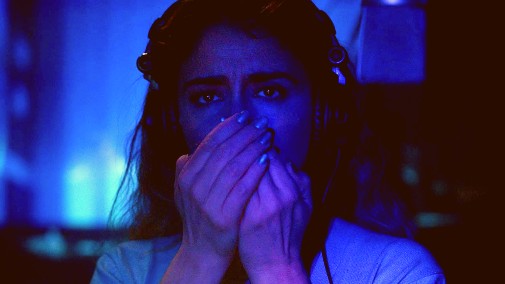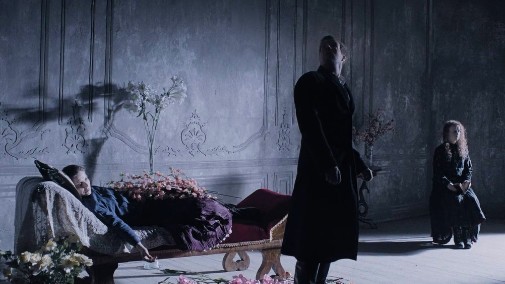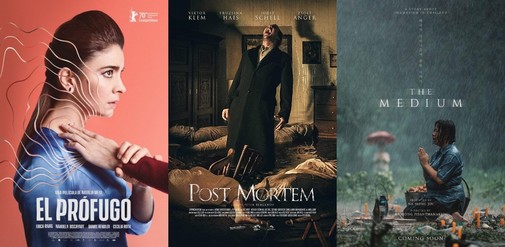Best International Film: Argentina, Hungary, Thailand
 Sunday, December 19, 2021 at 11:00AM
Sunday, December 19, 2021 at 11:00AM No matter how many masterpieces the genre regularly produces, the Academy cares very little for horror. Every year, a bunch of cinematic nightmares get critical raves and sometimes box office success but fail to capture AMPAS' attention. Not even the Makeup and Hairstyling category, a logical place to reward a cinema full of dilacerated flesh, is very keen on horror. The same happens with the Best International Film race, though that doesn't stop some brave countries from submitting scary movies. This year, some of the more horrific offerings include submissions from Argentina, Hungary, and Thailand…

THE INTRUDER (Argentina)
Like other fellow Best International Film submissions, The Intruder starts with an introduction so robust it could be an independent short film. Not that Natalia Meta's film is nearly as lengthy as Drive My Car. In these matters, it sits closer to Brazil's Private Desert, another narrative that opens with notes of sexual frustration. For Inés, a romantic vacation turns into a nightmare long before there's a dead body floating in the hotel pool. Her companion, Leopoldo, is a loud annoying man prone to private cruelty and public shows of insincere devotion. A plane trip with him is a cringy comedy of manners, while an erotic episode turns into a theater of discomfort.
Luckily, he's only around for that prelude. However, his presence lingers, haunting the film, intruding on Inés' life as a choir singer and dubbing actress. As if Weerastehakul's Memoria had a bastard child with an Italian Giallo, The Intruder dovetails into sheer storytelling lunacy, colorful violence, and flimsy character building – all anchored by top-notch sonic phantasmagoria. It doesn't all make sense, and some of the narrative leaps feel like mere justifications for the formalistic spectacle. Still, it's wildly entertaining and so tethered to dream logic that, after a while, it's easier to surrender to the madness than try to make sense of it.
At the center of this cinematic hurricane, Érica Rivas delivers a powerhouse performance. Meta trusts her leading lady to hold down the fort, negotiating the tonal rollercoaster of the script. When Inés gives herself in to trauma, when she lets her fractured emotions take control and falls in love with mystical dreams, Riva is given a platform to show off everything she's got. Arriving at a musical finale, this adaptation of C.E. Feiling's El Mal Menor becomes the tale of a woman who finds her voice, not by running away from her demons but embracing them. B+

POST MORTEM (Hungary)
Death is everywhere in Péter Bergendy's Post Mortem. At the end of World War I, around 40 million had lost their lives. The Spanish flu took care of reaping even more lives in its aftermath, leading to the demise of approximately 50 million people worldwide. The dead pile up. They become mountains of rotting flesh, reminding the living of what was lost and what awaits them in the inevitable end. In Hungary, an erstwhile soldier turned photographer turned that into a money-making opportunity. After having narrowly avoided it on the battlefield, Tomás chases death as he makes a living out of staging the dead in post mortem tableaux.
It's a way to help reconcile the pain of grief with the necessity to go on, material memories of a soul gone too soon that their loved ones can keep, like treasures. Indeed, it's this desire to mourn properly that makes a little girl invite Tomás to her village. There, he finds a farming town desolated by the pandemic. He also finds what could constitute a gaping gate to hell. It starts subtly enough, with shadows in places where there should be light. It quickly worsens into ghostly murder. The spirits in Post Mortem aren't interested in suspense, you see. They like to make themselves heard loud and (not so) clear.
The last act of the movie is when shit truly hits the fan. Suddenly, the dead have risen, and the living fly through the sky, suspended by ungodly forces demanding attention. Walls cry until houses turn into pools, and fires break out and paint the town with infernal blaze. As for Tomás, he becomes the reluctant hero in the quest for spiritual peace, pulled into what can best be described as a morbid vision quest into the limbo between life and death. It's all very grandiose and absurd, though the gore effects are up to the task of matching the screenplay's insanity beat by beat. In the end, though, while it toys with exciting ideas about how we collectively cope with mass death, Post Mortem is shallow to a fault. I had fun, though. C+

THE MEDIUM (Thailand)
There are words one thinks they'll never write, not sincerely at least. Yet, here we are, and I must criticize a movie for being too well-shot. Allow me to explain. Banjong Pisanthanakun's The Medium is a horror movie about a shaman trying to help her niece survive a demonic possession. So far, so good. The problem comes when we arrive at the director's chosen style. You see, The Medium plays as a fictional documentary, complete with interview footage, explanatory title cards, and even some security cam footage. Despite this, there seems to exist a reluctance to let the film look like the low-budget doc it purports to be.
Cinematographer Naruphol Chokanapitak has lit every scene with painterly gradations of light and shadow, making even the remote woods look like studio-bound perfection. Despite the shakiness of the image, most frames are beautiful to behold, polished Grand Guignol where even the most mangled body is rendered with glossy digital crispness. To shoot what is, essentially, a found footage scary movie like this is to shoot one's own foot. All the tension that could come from the doc affectations becomes void, undercutting the harrowing narrative of a family under siege by supernatural enemies.
The writing doesn't as it's fully committed to the unarticulated ramblings of a fly-on-the-wall cinema verite. Still, the general plot has weight and a sense of tragedy that's worthy of applause. The role of shaman is both a blessing and a curse. It's a blood inheritance that dooms generations of the same clan to a life in service of the divine. Way before the film starts, sins have been perpetrated, and their effects reverberate decades after the fact. In the end, it all catches up on you, every selfish decision mutating until it becomes a poodle-eating beast. Unfortunately, a good premise alone does not make good cinema. C-
Oscar Odds? Let's be serious. This is horror and the Academy we're talking about. None of these stand a chance at Oscar gold. Even so, The Intruder might be a surprise shortlist inclusion by virtue of its star studded-cast – Érica Rivas! Nahuel Pérez Biscayart! Cecilia Roth!



